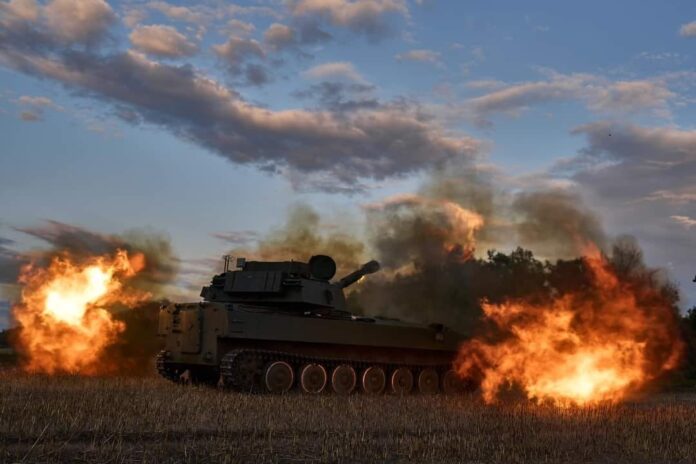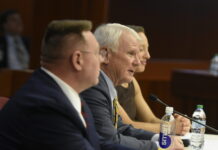
WASHINGTON (States Newsroom) — In the days leading up to the third anniversary of Russia’s full-scale invasion of Ukraine, President Donald Trump has careened U.S. foreign policy into uncertainty about the role America will play in ending the war and respecting the tenet of sovereign borders.
The Trump administration, in the past 10 days, reopened communications between the Oval Office and Russian President Vladimir Putin — the first time since 2022 — and stunned European allies with whiplash-inducing comments at a security summit in Germany and on social media.
“I’ve had very good talks with Putin and had not such good talks with Ukraine. They don’t have any cards but they play it tough,” Trump told the National Governors Association Friday morning.
Mike Waltz, the president’s national security advisor, told an audience at the Conservative Political Action Conference Friday that Ukrainian President Volodymyr Zelenskyy “is going to sign” a deal that would give the United States access to Ukraine’s rare-earth minerals in exchange for security assistance.
Minerals like aluminum, gallium and titanium are critical for the production of semiconductors and other advanced technology for military equipment, cars and devices.
The administration is framing the deal as an “obligation” to the U.S. taxpayer and an “opportunity” for Ukraine.
“There can be, in my view, nothing better for Ukraine’s future and for their security than — than to have the United States invested in their prosperity long-term,” Waltz told reporters at the White House briefing Thursday.
The U.S. has provided Ukraine with billions in security assistance and foreign aid since 2022. The Trump administration’s about-face calls into question what a ceasefire would look like, whether Ukraine will have the support to rebuild and remain secure and how Congress will proceed.
Mixed signals
Secretary of State Marco Rubio, Middle East Special Envoy Steve Witkoff and Waltz met with Russian negotiators in Saudi Arabia Tuesday to discuss ending the conflict, without Ukrainian officials.
Rubio said the parties agreed to restart their diplomatic missions in Washington, D.C., and Moscow, and said Trump intends to meet Putin, but could not provide a date.
“President Trump has made it – he made it very clear during the campaign he thought this conflict needed to end. He’s the only leader in the world that could’ve started a process that we saw here today, and this process is going to continue,” Rubio told reporters during a press conference, carried by C-SPAN, at the Saudi royal family palace in Riyadh.
“And when you talk about an enduring and sustainable end to the conflict, it means one that’s acceptable to everyone involved in it. And that obviously includes Ukraine, but also our partners in Europe, and of course the Russian side as well,” Rubio said.
When asked by reporters if the talks excluded Ukraine and other European allies, Rubio said “no one is being sidelined here.”
At a press conference Tuesday night in Florida, Trump told reporters that he was “disappointed” that Zelenskyy decried leaving Kyiv out of initial talks.
“Today I heard, ‘Oh, well, we weren’t invited.’ Well, you’ve been there for three years … You should have never started it. You could have made a deal,” Trump said, falsely stating Ukraine started the war.
Prior to the all-out war, Russia had long been strong-arming Ukraine, forcefully annexing the Crimean Peninsula in 2014.
After amassing assets along Ukraine’s border, Russia launched a full-scale invasion of Ukraine on Feb. 24, 2022.
Trump: Zelenskyy is a “dictator”
Trump escalated his rhetoric Wednesday when he accused Zelenskyy of being a “dictator without elections.”
“Think of it, a modestly successful comedian, Volodymyr Zelenskyy, talked the United States of America into spending $350 Billion Dollars, to go into a War that couldn’t be won, that never had to start, but a War that he, without the U.S. and ‘TRUMP,’ will never be able to settle,” Trump wrote on his Truth Social platform.
The remarks on his Truth Social platform echo the Kremlin’s false claims that Zelenskyy is not Ukraine’s legitimate leader.
All parties in Ukraine’s parliament agreed to delay the country’s previously scheduled April 2024 elections until after the war’s end, as fact-checked by BBC Verify.
Trump’s claim of how much money the U.S. sent to Ukraine is also not accurate.
Congress has appropriated nearly $183 billion for Ukraine since 2022, according to the Special Inspector General that oversees the U.S. response to the Russia-Ukraine conflict.
Zelenskyy said Trump is “living in a disinformation space.”
Members of Senate back Ukraine
On the Senate floor Thursday, Democrat Jeanne Shaheen of New Hampshire and Republican Thom Tillis of North Carolina reiterated their support for Ukraine. The bipartisan pair, along with Democratic Sen. Michael Bennet of Colorado, had just returned from a trip to the war-torn country.
“Vladimir Putin is responsible for this. He’s responsible for the bodies in Bucha and for thousands across Ukraine, and he’s got to be held accountable. We cannot let him get away with this,” said Shaheen as she stood before two large photos of victims in the streets and mass graves uncovered in the city of Bucha.
“There is bipartisan support for Ukraine (in) Congress. I believe we will continue to support funding, and that if we had another supplemental bill that came to the floor, it would pass with Republican votes,” Shaheen continued.
The top-ranking Democrat on the Senate Committee on Foreign Affairs said she’s appealed to Rubio about granting waivers to restart the flow of humanitarian aid back into Ukraine. Foreign aid was one of the first things Trump cut upon taking office.
Tillis said Putin is no stranger to “terrorizing populations,” even as far as Africa, referencing the Russian state-funded mercenary groups on the continent.
“That is what Vladimir Putin does every single day, 24-7-365,” he said.
Tillis pointed to the photo of a mass grave and said, “I went to this site. I saw it first hand.”
“This is how he’s trying to win the war, because he can’t win the hearts and minds of Ukrainian people. He’s destroyed the hopes and dreams of anybody that’s lived in the Soviet era, and he wants that to reemerge, and he’s willing to do anything, including terrorizing innocent civilians to break their will,” Tillis said, referring to Putin.
European visits to D.C.
French President Emmanuel Macron and British Prime Minister Keir Starmer are expected on separate visits to Washington, D.C., next week.
Stephen Sestanovich, senior fellow for Russian and Eurasian studies at the Council on Foreign Relations, said Zelenskyy will “be counting on them.”
“He wants the administration to hear that Europeans reject this way of talking about Ukraine, and even more to the point, reject the suggested approach — excluding Ukraine from negotiations, not listening to their point of view about the terms of any settlement and disparaging Zelenskyy,” Sestanovich told reporters during a virtual press briefing Thursday.
Concern from Ukraine and Europe largely centers on Ukraine’s geopolitical orientation and boundaries — and maintaining sovereign control of its government and the territory it maintains after the war.
“Because the Russians are unlikely to accept this, and because you have to have a lot of negotiation, there shouldn’t be anything more given to the Russians in advance for free,” Sestanovich said. “I mean, the Trump administration seems to think that offering up concessions for free is a good strategy.”







